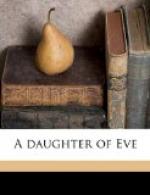When Marie-Angelique left the maternal purgatory, she rose at once into the conjugal paradise prepared for her by Felix, rue du Rocher, in a house where all things were redolent of aristocracy, but where the varnish of society did not impede the ease and “laisser-aller” which young and loving hearts desire so much. From the start, Marie-Angelique tasted all the sweets of material life to the very utmost. For two years her husband made himself, as it were, her purveyor. He explained to her, by degrees, and with great art, the things of life; he initiated her slowly into the mysteries of the highest society; he taught her the genealogies of noble families; he showed her the world; he guided her taste in dress; he trained her to converse; he took her from theatre to theatre, and made her study literature and current history. This education he accomplished with all the care of a lover, father, master, and husband; but he did it soberly and discreetly; he managed both enjoyments and instructions in such a manner as not to destroy the value of her religious ideas. In short, he carried out his enterprise with the wisdom of a great master. At the end of four years, he had the happiness of having formed in the Comtesse de Vandenesse one of the most lovable and remarkable young women of our day.
Marie-Angelique felt for Felix precisely the feelings with which Felix desired to inspire her,—true friendship, sincere gratitude, and a fraternal love, in which was mingled, at certain times, a noble and dignified tenderness, such as tenderness between husband and wife ought to be. She was a mother, and a good mother. Felix had therefore attached himself to his young wife by every bond without any appearance of garroting her,—relying for his happiness on the charms of habit.
None but men trained in the school of life—men who have gone round the circle of disillusionment, political and amorous—are capable of following out a course like this. Felix, however, found in his work the same pleasure that painters, writers, architects take in their creations. He doubly enjoyed both the work and its fruition as he admired his wife, so artless, yet so well-informed, witty, but natural, lovable and chaste, a girl, and yet a mother, perfectly free, though bound by the chains of righteousness. The history of all good homes is that of prosperous peoples; it can be written in two lines, and has in it nothing for literature. So, as happiness is only explicable to and by itself, these four years furnish nothing to relate which was not as tender as the soft outlines of eternal cherubs, as insipid, alas! as manna, and about as amusing as the tale of “Astrea.”




